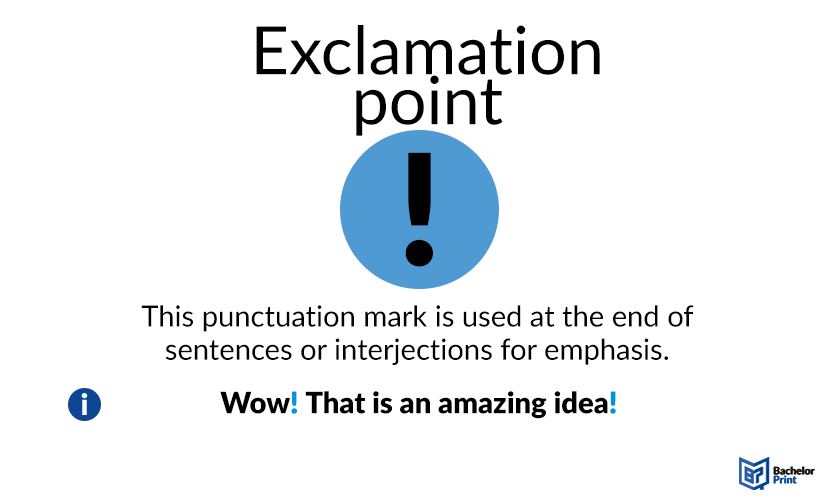
Exclamation points in academic writing are a subject of much debate. While they are sometimes used for emotional intensity, they are often viewed as unprofessional in many aspects of academia. Punctuations are a vital part of language rules as they’re used to denoting extreme emotion in text, such as surprise, fear, or anger. Read on to find out all you need to know about the exclamation point.
Definition: Exclamation points
The exclamation point — or exclamation mark — is a punctuation mark that follows after an interjection or exclamation. Instead of a period or full stop, this vertical line with a dot at the bottom (!) represents heightened emotions, whether that be a shriek from shock or a command rooted in anger. In informal writing, such as texting, exclamation marks can be repeated to emphasize an even stronger emotion. However, in academic writing, they should be avoided.

Types
Unlike declarative sentences — ending in a period — exclamations can be used in a more versatile manner, as can be seen in the types below.
This terminal punctuation — punctuation that is used to show the end of sentences — can appear as part of a title of work, in the end, or in the middle of a sentence.
You should avoid using multiple exclamation marks in your formal writing. When texting informally, however, you can use multiple exclamation marks ironically or just for emphasis. Nevertheless, before you use multiple exclamations in your every text, remember this quote:
“Multiple exclamation marks,” he went on, shaking his head, “are a sure sign of a diseased mind.”
― Terry Pratchett
In formal writing, one singular terminal punctuation should be used, meaning that if it is an exclamation, only use an exclamation mark. However, when texting or during conversations online, people oftentimes combine the exclamation and question mark to overly emphasize an emotion.
The inverted or upside-down exclamation point is used to start exclamatory sentences in Spanish and other languages that have ties to Spanish culture, and then end with our regular exclamation point.
In texts and social media, the red exclamation mark emoji symbolizes emotions like excitement, surprise, urgency, and other emotions, just like the regular punctuation mark. There are other versions as well, such as the white, the double, and the heart exclamation points.
The interrobang was invented in 1962 by Martin K. Speckter, and although it is a non-standard punctuation, it’s intended to be used in rhetorical questions by combining a question mark and an exclamation point. By the way, the ⁉️ emoji has a similar function to the interrobang.
Sometimes, writers place an exclamation mark in parentheses (or brackets in the UK) to show surprise or humor at something being quoted. If the news becomes progressively good or surprising, you can add even more exclamation marks.
Use & purpose
The exclamation point has many different uses and purposes.
Commands
With the use of exclamation points, you can change polite requests into commands.
In the first sentence, readers can notice that the tone of the request is calm and polite, which is aided by the adverb “please.” The lack of “please” and the addition of an exclamation point in the second sentence, make it sound less polite and more forced, as if they really needed the money, and you can’t say no.
Emphasis
If an exclamation is not enough to get your point across, you can add an interjection instead of an excessive amount of exclamation points. Interjections are words or phrases that express sudden reactions and can stand alone or be incorporated into sentences.
These two interjections highlight reactions or feelings, while also adding realism and humor in dialogue. Instead of just yelling for someone to “come back,” the interjection “hey” adds an element of exasperation.
Exclamations
To make an exclamation, you need to add an exclamation point to a declarative sentence, which is a statement that relays information. This type of sentence ends with a period and states facts or opinions.
The transformation from declarative sentence to an exclamation changes the entire tone of the sentence. While the first sentence is a simple observation, the second one exudes a sense of panic or excitement, depending on how you look at it.
Rules
When it comes to punctuation, there can be a lot of rules on what to do and what not to do. So, let’s look at some of the most important ones when it comes to exclamation points.
Exclamations and quotations
When an exclamation is part of the quotation, put the exclamation point inside closing quotation marks. When the exclamation applies to the entire sentence, put it outside.
Capitalization after exclamations
When a sentence ends in an exclamation point, the word after it should always be capitalized because it begins a new sentence. However, if the exclamation point is part of a quoted sentence and is immediately followed by a dialogue tag (like “he said”), the tag is not capitalized since it is considered a continuation of the quotation rather than a new sentence.
Exclamations and parentheses
Similarly to exclamations and quotations, when the exclamation point is part of the parentheses, it appears inside it and vice versa.
Printing Your Thesis With BachelorPrint
- High-quality bindings with customizable embossing
- 3D live preview to check your work before ordering
- Free express delivery
Configure your binding now!
Examples
Below, you can find even more exclamation points examples.
FAQs
Exclamation points can be used to turn a statement into an exclamation, turns a request into a command, and to emphasize different emotions with interjections.
Just like the regular exclamation point, the emoji underlines emotions such as urgency, excitement, and others.
Multiple exclamation points underline or exaggerate an emotion dramatically. For example, to show even more joy or excitement, you can turn a simple “Yay!” into an exaggerated “Yay!!!”
- I can’t believe we did it!
- Hooray! We won!
- Oh no! I left the pizza in the oven!
- Clean your room!
- Again? You ordered food two days ago!
- We give this one three big booms!
- No, I’m serious!
- My cat is cuddling with my dog!
- A question mark is just an explanation mark with a curve!
- I’m tired. Let’s end this here!